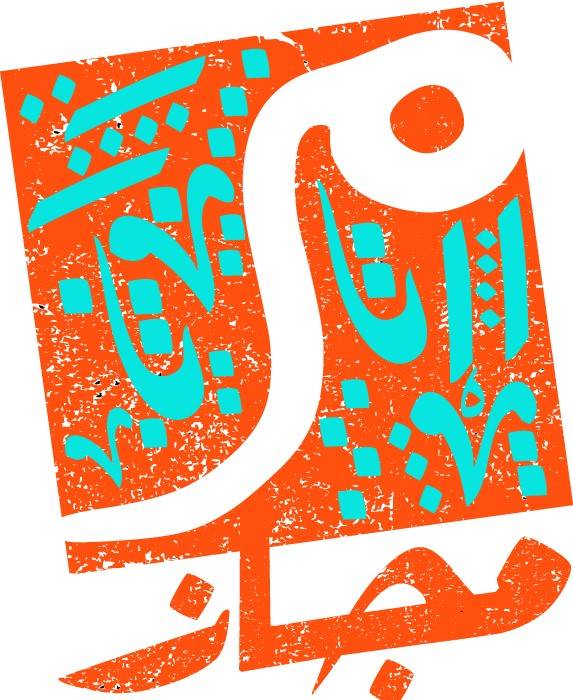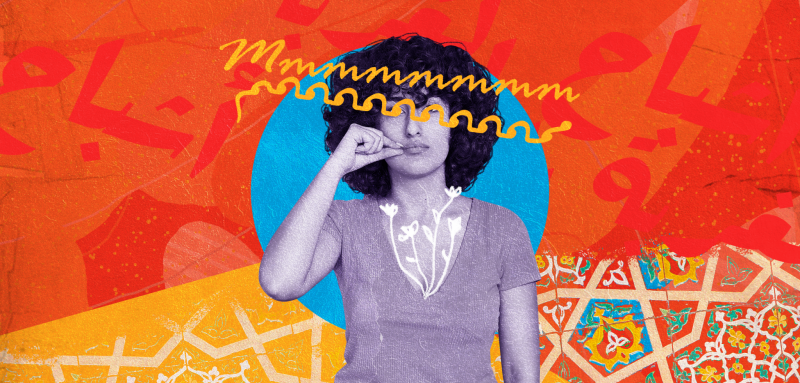 Ghorba ghosts
Ghorba ghosts
prepared by R22 April Guest Editor Massoud Hayyoun
I.
My words aren’t like most people’s words.
I was born with a stutter. My letters, syllables, words take their time. They jump around, they stretch, and sometimes they hold my vocal cords so that I’m unable to make a sound, until they’re ready to be spoken. My speech takes its time. Though I prefer to think my speech does not follow our standards of time. That maybe it’s trying to tell me something. To take my time. That everyone else’s time isn’t necessarily the right time to be on. And to be generous in giving time to others. These are the tiny gifts I realized my stutter gave me as I grew older.
In English, the first syllable of my name takes a long time. Mmmmmmmm--
As if it’s getting up after a long nap to have a leisurely stretch, before it leaves my mouth. Sometimes “a” doesn’t want to come out. Sometimes it comes out with ease. It seems to depend on what mood my stutter is in that day.
In Arabic, the first م is shy, and it takes some time until she’s ready to come out. Sometimes when I voluntarily prolong the ر, the rest of my name is easier to say. The last syllable comes out quickly, as if it were impatient to get to the next word.
Mmmmmma—mmmmmmmarriam
...
…
مممرررررررررريم
In fact, there’s a predictable way to how my name will come out, whether it’s in the “English way,” or in the “Arabic way.” Unpredictability may be the only predictable thing about my stutter: regardless of which “language” I say it in, it will not come out fluently. My stutter is its own entity, another being that controls my words.
Unpredictability may be the only predictable thing about my stutter: regardless of which “language” I say it in, it will not come out fluently. My stutter is its own entity, another being that controls my words
II.
When I speak English, my stutter just wants me to slow my words down, or say them differently.
But in Arabic, it’s as if my stutter is afraid of something. My words take even longer to come out. Many times, I don’t wait to see exactly how long it will take and switch to English if I see the person I’m speaking to about to say something. Sometimes they’ll beat me to it and say something along the lines of: If Arabic is hard, just say it in English.
Arabic is not hard; what is it afraid of? When did it want to stop me from speaking Arabic? Was it when I started school and had to use English after mostly speaking Arabic at home? Was it after 2001, when I wanted to hide any trace of my Arabic-speaking background? Or is it just shy of how I sound when I speak Arabic?
It’s funny. I’ve long gotten past all of those things. I’ve grown to see my Egyptian, Arabic-speaking heritage as a source of enrichment. But my stutter doesn’t seem to have caught up.
If I sing, or speak in a fake accent, my stutter lets my speech flow fluently, an undisturbed stream. It’s because, unlike everyday speech, singing, and speaking as if one is acting, all use different brain paths, so my stutter does not present itself in those situations. Sometimes I wonder if I could speak with ease if I envision we’re living in a Souad Hosni musical.
I often have to explain myself when I meet someone who speaks Arabic, I know I can say the letters ع and ح and ق. My brain remembers the sounds and how to make them. I know exactly what part of the throat each letter comes from. I can feel myself able to pronounce these letters. I try to say words like: بحر , قهوة, عين. Even when I pronounce my own last name, علبة, I feel my vocal cords freeze. I cannot remember the last time I was able to say my full name, مريم عبدالفتاح علبة without needing to explain that it will take me some time.
I have to explain that I do know how to say ع. I know exactly how far back in the throat to reach for that sound. But my stutter does not want me to say it, as if it’s afraid to have me say my name the way it’s meant to be said. As if it’s telling me to make do with replacing ع with the English “a” or “e.”
One of the things I love about being in Masr is the ease with which one can just strike up conversation with anyone
III.
A few years ago, I was with my cousins in Alexandria and we wanted to buy ful and falafel sandwiches. I insisted on trying to make the order to the cashier myself. Maybe my stutter will acclimate if I practice speaking more, I thought.
My stutter makes my words feel like a stubborn cat. Sometimes the words come out with ease, even if there are small stops and starts in their pronunciation. This time, I could not get passed the first syllable of the word واحد. My body remembers how to say it. But again, my stutter freezes my vocal cords. The cashier looks at me, confused. I’ve been here countless times, a surge of thoughts comes in, as I’m struggling to say واحد. واحد ساندوتش فول و فلافل. I wonder how much time has passed and how many people are waiting behind me. The cashier starts to look impatient. My cousin senses my discomfort, steps in and says the order for me. I am thankful to him and, at the same time, profoundly disappointed in myself.
One of the things I love about being in masr is the ease with which one can just strike up conversation with anyone. While waiting for the mashrou3, or the microbus as it’s known in Cairo, with the person at the kushk, the cab driver, or waiting on line to get into the library. I always envy how easy it is for my mom, my cousins, or my friends to just talk, to be able to connect people as we go about our everyday. I watch them, and I feel like a fly on the wall, an observer, not a participant.
When I speak English, my stutter just wants me to slow my words down, or say them differently. But in Arabic, it’s as if my stutter is afraid of something
IV.
It’s 6:00am in New York, and I am about speak to a group of colleagues, fellow journalists, in the Arabic-speaking world via zoom. I don’t feel nervous about co-hosting a day-long workshop more than what I’m about to do: fully introduce myself and tell the attendees about my stutter.
انا سعيدة جدا ان انا معاكم النهاردة. دي اول مرة اشترك في وركشوب زي دي مع صحفيين في الشرق الأوسط فدة شرف كبير ليا. زي ماانتوا سمعين انا عندي شوية تلعثم في الكلام فاشكركم جدا لصبركم معايا.
I slip up, take a little long to say some words. But I get it out there. All of it. As I finished saying my introduction, I make eye contact with the screen. I see smiling faces, heart emojis, and messages saying احنا اسعد and ولا يهمك.
I did it. In disbelief and euphoria, I smile back and press forward.
Raseef22 is a not for profit entity. Our focus is on quality journalism. Every contribution to the NasRaseef membership goes directly towards journalism production. We stand independent, not accepting corporate sponsorships, sponsored content or political funding.
Support our mission to keep Raseef22 available to all readers by clicking here!
Interested in writing with us? Check our pitch process here!



